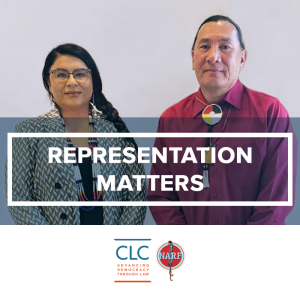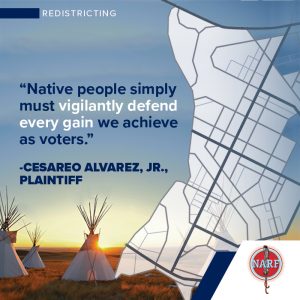By Michael Carter, NARF Staff Attorney, and Mel Neal, Legal Fellow at CLC.
North Dakota has a long and ongoing history of discrimination against Native Americans, including denying Native voters an equal voice in the state’s elections.
Until 1922, North Dakota barred most Native people from voting. Even after North Dakota finally allowed Native Americans to vote, state officials continued to pass laws and adopt practices that discriminate against Native voters. For example, the state enacted voter ID laws in 2013 and 2017 that targeted Native voters and made it harder for voters living on reservations to vote.
North Dakota’s history of discrimination is reflected in the makeup of the state legislature, where North Dakota politicians have drawn unfair voting maps.

Based on relative population size, Native Americans should hold three state senate seats and six state house seats in the state legislature. But under the most recent redistricting plan adopted in 2021, there were no Native American state senators serving in the legislature for the first time since 1990 and Native Americans held just two state house seats.
Over the past five years, Campaign Legal Center (CLC) and the Native American Rights Fund (NARF) have often partnered together to fight on behalf of Native voters in North Dakota.
Most recently, CLC and NARF, alongside other counsel, represented the Turtle Mountain Band of Chippewa Indians and the Spirit Lake Tribe in Turtle Mountain Chippewa et al v. Howe and the Mandan, Hidatsa, and Arikara (MHA) Nation in Walen v. Burgum, two lawsuits seeking to ensure that Native North Dakotans have an equal opportunity to have their voices heard in state government.
In the Turtle Mountain case—brought by the Turtle Mountain Band of Chippewa Indians, the Spirit Lake Tribe, and affected Native voters—a federal court found that North Dakota’s 2021 redistricting plan discriminated against Native voters in the northeast part of the state.
Specifically, the Turtle Mountain court found that under North Dakota’s 2021 redistricting plan, Native Americans saw decreased representation in the state legislature.
This was due in part to the “cracking” and “packing” of Native voters on and around the Turtle Mountain and Spirit Lake reservations, which drowned out Native voices and made it harder for Native voters to elect leaders who would best serve their communities. The Eighth Circuit Court of Appeals has denied the state’s request to pause the injunction pending appeal, meaning a nondiscriminatory map will be in effect for the 2024 election.

In addition to challenging unfair districts drawn by state politicians, Native voters have also had to fight to preserve existing fair districts.
In Walen v. Burgum, for example, non-Native voters challenged the creation of a state house subdistrict that ensured Native voters living on MHA Nation’s Fort Berthold Reservation have a fair chance at electing representation in the state house, as required by Section 2 of the Voting Rights Act.
Represented by NARF, CLC and the Law Office of Bryan L. Sells, LLC, the MHA Nation successfully defeated that challenge, preserving the district.
The Turtle Mountain and Walen lawsuits create and preserve fair maps and equitable representation for Native voters in North Dakota, and both cases resulted in pro-voter decisions and major victories for Native voters and fair representation.
Pending the outcome of any appeals, these cases mean that Native voters living on and around the Turtle Mountain, Spirit Lake, and MHA Nation Reservations will have a fair shot at making their voices heard in the state’s elections and electing their preferred candidates to the state legislature.
Furthermore, as Tim Purdon, counsel for the Turtle Mountain and Spirit Lake Tribes and former United States Attorney for the District of North Dakota, explained with respect to the Turtle Mountain case, these cases also paved the way for the next generation of Native lawyers to participate in a civil rights case and defend Native Americans’ freedom to vote:
“It’s really important that we have Native American lawyers who are part of the team, who are a key part of this…We’re training a new generation of civil rights lawyers in this trial… And without NARF and the Campaign Legal Center, this case simply wouldn’t have been [as successful.] It’s [been] so important to have their participation in the case.”
The fight for fair representation and equitable access to the ballot box for Native voters in North Dakota and across the country will continue, but these historic victories should be celebrated as major steps forward in the fight for Native American voting rights in North Dakota.
More blog posts

